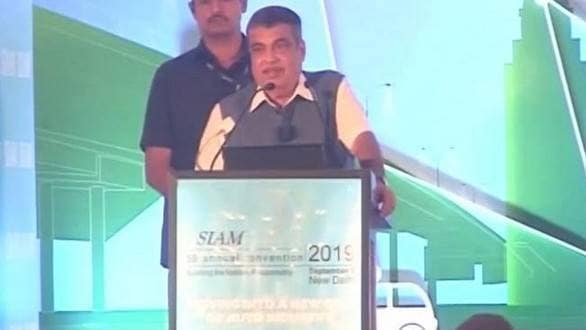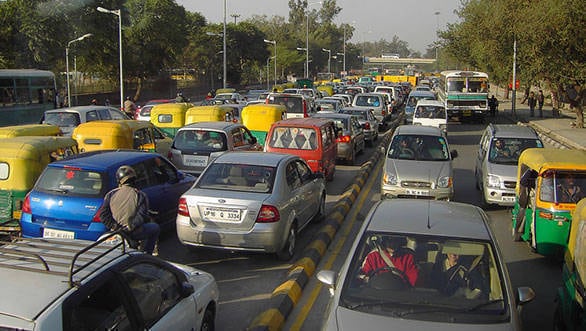59th SIAM annual convention: Petrol and diesel vehicles won't be banned, confirms Nitin Gadkari
At a point in time when the Indian automobile industry is looking at different measures to deal with one of the worst slowdowns in two decades, Nitin Gadkari, Minister of Road Transport and Highways of India has cleared the air over the future of petrol and diesel cars in India. At the recently held 59th SIAM (Society of Indian Automobile Manufacturers) annual convention, the Union Minister announced the government's take on the BSVI emission norms that come into effect next year, shift to electric vehicles and also how it is looking at private investments in the public transportation sector to bring in necessary growth.

Addressing automobile and ancillary manufacturers present at the 2019 SIAM convention, the minister mentioned, "We know what you are worried about now. The government is also concerned. The slowdown has relation to employment potential as well as the growth of the country. The finance minister, Nirmala Sitharam is trying to find solutions". He also added, "The government is not proposing to ban petrol and diesel cars in the country. The ₹ 4.50 lakh crore automobile secto, provides a lot of jobs and exports too have increased. But the government is facing some problems. First among which is the cost of import of crude oil. The second is pollution and the third is road safety."
Expressing the government's concern over the rising issue of air pollution, Gadkari stated that the Indian automobile industry has to move to alternative sources of energy which are cleaner and more sustainable than the present options. He also added that bringing air pollution down is not just the responsibility of the automobile sector but is of national interest too at the SIAM event.

Automobile sales dropped further by 20 per cent in the month of August. To address this, SIAM had suggested the government to reduce the GST from 28 per cent to 18 per cent. This, as believed by the body, would help manufacturers price their offerings in an attractive manner that will also help create demand. Gadkari stated that he will take up the same with the Finance Minister. The SIAM has further suggested the initiation of a scrappage policy so that users are encouraged to replace their vehicles, helping sales grow. And that is not just the case with passenger cars but also commercial vehicles and two-wheelers who have been affected by the slowdown. This was in spite of the different measures that the FM has announced last month.
Talking about the issues related to auto financing, Mr Gadkari asked the auto industry to establish their own, proprietary financing arm to boost sales. He stated, "The industry has asked that there should be a reduction in GST of petrol and diesel vehicles considering the forthcoming increase in prices of vehicles and the BSVI norms deadline. Even if GST is reduced for some time, it will help the sector to increase vehicle sales." He also said, "GST on electric vehicles has been reduced from 12 per cent to 5 per cent. I will propose to the finance ministry to make the same benefit available for hybrid vehicles."
 The preventive measures the government is taking to make things cleary and to boost auto sales are as follows:
1. Petrol and diesel powertrains won't be banned.
2. BS-VI vehicles will be more expensive, so carmakers need to find new ways to ease buying for the consumer.
3. Will propose to the Finance Minister to offer GST reduction benefit on hybrids.
4. Will also propose to the FM to offer tax relief on petrol and diesel fuels amid rising crude oil prices.
5. Proposes the auto industry to device their own finance schemes to counter the challenges posed by the banks.
6. Proposes adoption of London transport model.
7. Proposes private investment in public transport to add up to 15 lakh buses and subsequently generate employment.
8. Says that the Road Transport Ministry will award 68 new road projects in the next three to four months, worth Rs 5,00,000 crore.
9. Encourages and hints about incentives on exports from the auto industry.
10. Suggests the auto industry focus on improving manufacturing quality more than cost reduction.
Rajan Wadhera, President, SIAM & President (Automotive Sector), Mahindra & Mahindra Ltd reiterated the need to reduce GST on automobiles to Mr Gadkari. He also highlighted the need for the government to consider a single nodal regulatory ministry for the auto industry. "The automotive industry is integral to economic and social development of the nation. With BSVI norms coming into effect from April next year, restrictions on different vehicles based fuels needs to be removed for the auto industry to be at par with the best in the world when it comes to pollution."
Speaking on the auto component industry, Ram Venkataramani, President, ACMA & Director, Amalgamations Component Group, said that the auto component industry crossed the 57 billion dollar mark in 2018-19. Talking about the importance of the sector, he said "The industry currently employs 50 Lakh  people and contribute 2.3percent to the country's GDP. The current transition to BSVI norms has also impacted our revenues to an extent."